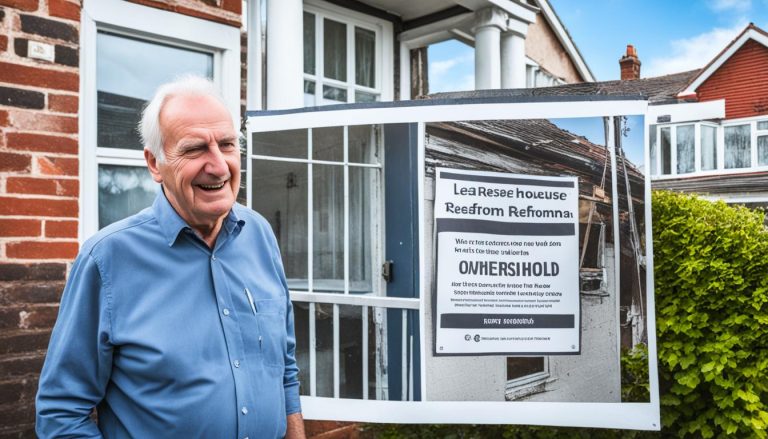Leaseholds are a common form of property ownership in the United Kingdom, particularly in the case of flats and apartments. However, it’s important for leasehold property owners to understand what happens when a leasehold expires. In this section, we will explore the leasehold expiry process and the implications it can have on property owners.
When a leasehold expires, it means that the lease agreement between the property owner (the leaseholder) and the freeholder (the entity that owns the land) comes to an end. This can have significant consequences for the leaseholder, as they may lose certain ownership rights and face potential financial implications.
The leasehold expiry process involves various steps and paperwork that need to be followed to ensure a smooth transition. It’s important for leaseholders to be aware of the timelines and deadlines associated with leasehold extensions, as failing to take action promptly can lead to further complications.
The implications of leasehold expiration can be far-reaching. Property owners may lose the right to occupy the property, and in some cases, the freeholder may take possession of the property. Additionally, the value of a property can be affected by leasehold expiration, making it important for leaseholders to consider their options for leasehold extension.
Seeking legal advice is crucial when dealing with leasehold expiration. A qualified solicitor or lawyer who specializes in leasehold matters can provide guidance on the legal aspects of leasehold extension and help protect the interests of the leaseholder.
In the following sections, we will delve deeper into the leasehold expiry process, the consequences of leasehold expiration, the different options available for leasehold extension, and the importance of seeking professional legal advice during this process.
Stay tuned to learn more about what happens when a leasehold expires and how you can navigate the leasehold expiry process effectively.
Understanding Leaseholds and Freeholds
In this section, we will explore the key differences between leaseholds and freeholds, and how leasehold reform and enfranchisement impact property ownership in the UK. Additionally, we will discuss the statutory rights that property owners enjoy after the expiration of a leasehold.
Leasehold vs Freehold
When purchasing a property, it’s important to understand whether it is a leasehold or freehold. A leasehold means that you have the right to occupy and use the property for a set period, typically between 99 and 999 years. On the other hand, a freehold grants you full ownership of the property and the land it stands on indefinitely.
Leaseholds are commonly associated with apartments, flats, and certain types of houses, while freeholds are more common for traditional houses and properties.
Leasehold Reform and Enfranchisement
Leasehold reform refers to the changes introduced to improve the rights of leasehold property owners. The reforms aim to address various issues, including unfair leasehold terms, escalating ground rent, and difficulties faced by leaseholders in extending their leases.
Leasehold enfranchisement, on the other hand, grants leasehold property owners the right to collectively purchase the freehold of their building or extend their lease. This can provide greater control and security for leasehold owners, giving them a stake in the management and future of their property.
Statutory Rights after Leasehold Expiry
Once a leasehold expires, property owners are entitled to certain statutory rights. These include the right to seek a lease extension or enfranchisement, which allows them to extend their lease or purchase the freehold of their property.
By exercising these statutory rights, property owners can secure their long-term ownership and ensure they have control over their property’s future. It is important to seek legal advice to understand the specific rights and options available in each individual case.

The Leasehold Expiry Process
If you own a leasehold property in the UK, it’s crucial to understand the leasehold expiry process. This step-by-step guide will take you through the necessary actions and paperwork involved, as well as the timelines and deadlines for leasehold extensions.
1. Assess Your Lease Term
Start by reviewing your lease agreement to determine the remaining lease term. Most leases are granted for a fixed period, typically between 99 to 125 years. Knowing how many years are left on your lease is essential when considering leasehold extension options.
2. Understand the Leasehold Extension Rights
Under the Leasehold Reform, Housing, and Urban Development Act 1993, qualifying leaseholders have the right to extend their lease or purchase the freehold. It’s essential to familiarize yourself with these rights, as they can significantly impact the leasehold expiry process.
3. Obtain Professional Valuation
Before proceeding with a leasehold extension, it’s advisable to obtain a professional valuation from a qualified surveyor. This valuation will determine the likely cost of extending your lease and help you make an informed decision.
4. Serve a Section 42 Notice
To initiate the leasehold extension process, you need to serve a Section 42 Notice on your landlord. This formal notice provides details of your intention to extend the lease and sets out the proposed premium for doing so.
5. Negotiate the Lease Extension Terms
Once the Section 42 Notice is served, negotiations on the lease extension terms will take place between you and your landlord. This includes agreeing on the lease length, the new ground rent, and the premium payable for extending the lease.
6. Reach a Lease Extension Agreement
Once the lease extension terms are agreed upon, a formal agreement known as a Lease Extension Agreement is drawn up. This document outlines the updated terms of the lease and is signed by both parties.
7. Register the Lease Extension
After the Lease Extension Agreement is signed, it needs to be registered with the Land Registry. This ensures that the updated lease terms are officially recognized and legally binding.
By following these steps, you can navigate the leasehold expiry process and secure a leasehold extension, giving you peace of mind and long-term security for your property.

| Benefits of Leasehold Extension | Considerations for Leasehold Extension |
|---|---|
|
|
Consequences of Leasehold Expiration
When a leasehold expires, property owners may face several consequences that can significantly impact their ownership rights and financial wellbeing. Understanding these implications is crucial for making informed decisions regarding leasehold extensions and property management.
Loss of Ownership Rights
One of the primary consequences of leasehold expiration is the loss of ownership rights. As the lease term comes to an end, the property reverts back to the freeholder, leaving the leaseholder with no legal rights to the property.
This loss of ownership can have profound implications, as it means that the leaseholder no longer has control over the property. They may need to vacate the premises or negotiate a new agreement with the freeholder to continue residing in the property.
Potential Financial Implications
The financial implications of leasehold expiration can vary depending on the specific circumstances and market conditions. One significant consideration is the potential costs involved in negotiating a new lease or extending an existing lease.
Property owners may also face additional expenses related to legal fees, valuation fees, and other administrative costs associated with leasehold extensions.
Impact on Property Value
Leasehold expiration can also impact the value of the property. Prospective buyers may be deterred by the limited lease term, which can make it challenging to sell the property at its full market value.
Additionally, the existence of a short remaining lease term can restrict the pool of potential buyers, reducing demand and potentially leading to lower offers.
Options for Leasehold Extension
Property owners facing leasehold expiration do have options to extend their leasehold and mitigate the consequences mentioned above. One common avenue is to negotiate a leasehold extension with the freeholder.
It’s important to note that the specific options and processes for leasehold extensions can vary depending on various factors, including the type of property and existing lease terms. Seeking legal advice from a specialized solicitor can help property owners navigate the complexities of leasehold extension and ensure their rights and interests are protected.
Here is a summarized table outlining the key consequences of leasehold expiration:
| Consequences | Explanation |
|---|---|
| Loss of Ownership Rights | Leaseholder loses legal rights to the property as the lease term expires. |
| Potential Financial Implications | Costs associated with negotiating a new lease or extending an existing lease, as well as additional administrative expenses. |
| Impact on Property Value | Limited lease term can reduce property value and restrict the pool of potential buyers. |
| Options for Leasehold Extension | Property owners have the option to negotiate a leasehold extension with the freeholder, seeking professional legal advice. |
By understanding the consequences of leasehold expiration and exploring available options, property owners can make informed decisions to protect their interests and maintain control over their properties.
Leasehold Extension Options
When the leasehold on your property is approaching expiration, it’s important to be aware of the options available to you for extending the lease. This section will explore different leasehold extension options, discussing their pros and cons, associated costs, and legal considerations.
Leasehold Extension Options:
- Voluntary Lease Extensions
- Statutory Lease Extensions
- Collective Enfranchisement
1. Voluntary Lease Extensions: This option involves negotiating with the freeholder or landlord to extend the lease on your property. It can be a more informal and flexible process, allowing you to negotiate the terms and length of the extension. However, it’s important to consider the potential costs involved, including professional fees and any ground rent increases.
2. Statutory Lease Extensions: In certain circumstances, you may be eligible to extend your lease through a statutory process outlined in the Leasehold Reform, Housing, and Urban Development Act 1993. This option provides a legal framework for leaseholders to extend their leases, offering more certainty and protection. However, there are specific criteria and procedures to follow, including qualification requirements and the payment of a premium.
3. Collective Enfranchisement: If you are a leaseholder of a property in a building with multiple flats, you may have the right to join forces with other leaseholders and collectively purchase the freehold of the building. This process, known as collective enfranchisement, can provide leaseholders with greater control and ownership over their property. It can also offer the opportunity to extend individual leases as part of the collective enfranchisement process.
It’s important to carefully consider the advantages and disadvantages of each leasehold extension option, as well as the associated costs. Seeking legal advice from a qualified solicitor who specializes in leasehold matters is highly recommended to navigate the complexities of the process and ensure your rights are protected.

Seeking Legal Advice for Leasehold Expiration
When it comes to leasehold expiration, seeking legal advice is essential to navigate the complexities of the process. A qualified solicitor or lawyer who specializes in leasehold matters can provide valuable guidance and ensure that your rights are protected.
So, how do you find the right legal professional? Here are some steps to consider:
- Start by asking for recommendations from friends, family, or colleagues who have dealt with leasehold expiration before. They may be able to refer you to a reliable solicitor who provided them with expert assistance.
- Consider consulting professional associations and regulatory bodies such as the Law Society or the Solicitors Regulation Authority. These organizations can provide you with a list of qualified solicitors specializing in property law and leasehold matters.
- Take advantage of online resources and directories that allow you to search for solicitors in your area. Look for professionals who have extensive experience in leasehold extensions and have a track record of successful outcomes.
- Once you have identified a few potential candidates, set up initial consultations to discuss your situation. Use this opportunity to evaluate their expertise, communication skills, and overall approach to your case.
- During the consultation, be sure to ask questions about their fees and any additional costs involved. Understanding the financial aspects upfront will help you make an informed decision.
- Finally, trust your instincts. Choose a solicitor who makes you feel comfortable and confident in their ability to handle your leasehold expiration effectively.
Now, let’s highlight the benefits of seeking legal advice:
- Expertise: A solicitor specializing in leasehold matters has in-depth knowledge of the legal framework and can provide you with accurate and up-to-date advice.
- Protection of rights: A legal professional will ensure that your rights as a leaseholder are protected throughout the leasehold extension process.
- Negotiation skills: If negotiations are required with the freeholder, a solicitor can advocate on your behalf and strive to achieve the most favorable terms for lease extension.
- Complex paperwork: The leasehold extension process involves extensive paperwork. A solicitor can help you navigate through these documents and ensure that all necessary legal requirements are met.
- Peace of mind: By seeking legal advice, you can have peace of mind knowing that an experienced professional is guiding you through the leasehold expiration and extension journey.
Remember, leasehold expiration is a significant event that can have long-lasting implications. By seeking legal advice, you can approach the process with confidence and ensure that your interests are protected every step of the way.
Pros and Cons of Seeking Legal Advice for Leasehold Expiration
| Pros | Cons |
|---|---|
| Expertise in leasehold matters | Professional fees and costs |
| Protection of leaseholder rights | Additional time for legal consultations |
| Negotiation skills with freeholders | Potential delays due to legal processes |
| Assistance with complex paperwork | Reliance on the availability of legal professionals |
| Peace of mind and confidence |

Conclusion
In conclusion, when a leasehold expires in the UK, it triggers a process that property owners need to be aware of. This article has provided an overview of the leasehold expiry process, including the necessary actions and paperwork involved. Understanding what happens when a leasehold expires is crucial for property owners to navigate the implications effectively.
Leasehold expiration can have significant consequences, such as the loss of ownership rights and potential financial implications. It is important for property owners to consider their options for a leasehold extension to maintain control over their property. Seeking legal advice during this process can provide guidance and ensure compliance with the relevant regulations.
To make informed decisions regarding leasehold expiration, property owners should carefully weigh the pros and cons of leasehold extension options. It is recommended to assess the associated costs, legal considerations, and potential impact on property value. Engaging with a qualified solicitor or lawyer specializing in leasehold matters can provide valuable expertise and support throughout the leasehold extension process.
FAQ
What happens when a leasehold expires in the UK?
When a leasehold expires in the UK, the ownership rights of the property revert back to the freeholder. The property owner will need to vacate the premises and may be required to return the property in its original condition. It is important to understand the leasehold expiry process and the implications of expiration.
What is the difference between leaseholds and freeholds?
Leaseholds and freeholds represent different types of property ownership. With a leasehold, the property is owned for a set period of time, as specified in the lease agreement. Freeholds, on the other hand, grant outright ownership of a property and the land it sits on. Leasehold reform and enfranchisement affect the status of a property and the statutory rights that property owners have after a leasehold expires.
How does the leasehold expiry process work?
The leasehold expiry process in the UK involves several steps. Property owners need to be aware of the necessary actions and paperwork required, as well as the timelines and deadlines for leasehold extensions. Seeking professional advice is recommended to navigate the process and ensure compliance with legal requirements.
What are the consequences of leasehold expiration?
Leasehold expiration can have significant consequences for property owners. It results in the loss of ownership rights, which means the property reverts back to the freeholder. Additionally, there may be financial implications, such as the potential need to pay rent to the freeholder or the impact on property value. Exploring leasehold extension options is crucial to mitigate these consequences.
What options are available for leasehold extensions?
There are various options for leasehold extensions in the UK. Property owners can negotiate with the freeholder to extend the lease, or they may be able to exercise their statutory rights under leasehold enfranchisement laws. It is essential to consider the associated costs, legal considerations, and the potential benefits and drawbacks of each option.
Why is it important to seek legal advice for leasehold expiration?
Seeking legal advice is paramount when dealing with leasehold expiration. A qualified solicitor or lawyer who specializes in leasehold matters can guide property owners through the process, ensuring that their rights are protected and that they understand their legal obligations. Professional assistance can help navigate complex legal issues and provide peace of mind during the leasehold extension process.
What are the key takeaways from this article?
This article highlights the key aspects of leasehold expiration in the UK. It explains the leasehold expiry process, discusses the implications of leasehold expiration, and explores the options for leasehold extension. It emphasizes the importance of understanding one’s rights, seeking appropriate legal advice, and being proactive in managing leasehold expiration to protect one’s interests as a property owner.






